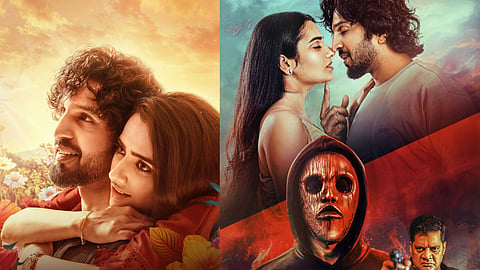I Am God Movie Review: Ravi Gowda channels Upendra’s signature style of cinema
I am God(3 / 5)
In I Am God, actor-director Ravi Gowda resurrects a kind of cinema Kannada audiences once associated with the maverick Upendra. His film is heavily influenced by Upendra’s brand of storytelling, one that is provocative, layered, and unafraid to question its own characters. Much like A and Upendra, which examined ego, gender, and identity through surreal narratives, Ravi Gowda’s debut mirrors that blend of chaos and contemplation. Yet, while the influence is evident, he filters it through his own experiences, giving the film a younger and more grounded texture.
The film follows Deva (Ravi Gowda), a college topper who is anything but the model student. He flirts with his girlfriend Bindu (Vijeta Pareek), brawls with rivals, and lives life as if it is one long memory in the making. Their youthful love, captured through tender close-ups, classroom kisses, and impromptu rides, forms the film’s emotional core. But alongside this softness runs a brutal thread, as a masked killer calling himself GOD commits a series of murders.
Cast: Ravi B Gowda, Vijeta Pareek, Ravi Shankar P, Avinash Ravi Shankar P, Aruna Balraj, and Niranjan Kumar
Director: Ravi B Gowda
This contrast between love and fear defines the film’s rhythm. The first half plays like a carefree campus drama, brimming with music and mischief, while the second half slides into psychological tension. Ravi Gowda uses this tonal shift to explore betrayal, trust, and justice, subjects Upendra often examined. Yet Ravi Gowda’s approach feels more street than sermon, lived-in and raw. The second half gives the film its weight, where Upendra’s influence becomes most evident in its bold questions and conflicted characters.
Cinematically, I Am God often feels like two films competing for attention: a romantic coming-of-age story and a grim detective mystery. The transitions are not always seamless, but they are daring. The direction handled by Ravi Gowda himself, observes both beauty and brutality. Close-ups of longing eyes are followed by trembling wide frames during chase scenes, making the visuals shift between tenderness and terror. It is a style that might divide audiences but also invites debate. Is the film about love corrupted by violence, or the violent ways love manifests?
Thematically, the film takes a strong step by positioning its female lead not as an accessory but as an anchor. Bindu is not a prop in Deva’s story; she is a mirror reflecting his insecurities and moral confusion. By giving the woman this kind of emotional agency, Ravi Gowda restores balance to a genre that often sidelines its heroines.
Where he falters slightly is in pacing. The first half overstays its welcome, lingering on fights and campus banter longer than needed. The second half, filled with twists and revelations, redeems it, but a tighter edit could have sharpened the impact. Still, the writing retains bite, especially the pre-climax dialogues that echo the philosophical madness of Upendra’s work, questioning who really plays God in our lives.
Performance-wise, Ravi Gowda juggles his multiple responsibilities with control. He moves between the charm of a lover and the rage of a man betrayed, embodying both shades convincingly. Vijeta Pareek grounds the film with grace and realism, while Ravishankar’s intense portrayal of a hardened cop adds grit. Supporting actors like Avinash, Aruna Balraj, and Vijay Chendoor bring texture to the film’s moral landscape.
Ajaneesh Loknath’s score complements the story, and the song picturised on Diganth and Niveditha Gowda stands out as a rare instance where a commercial number feels emotionally connected to the plot.
Ultimately, I Am God is a conversation between generations of Kannada filmmakers. Ravi Gowda does not imitate Upendra; he absorbs his influence and translates it into something of his own. The result is an uneven yet fearless film that dares to merge love, crime, and existential doubt into one frame.
It may lack the philosophical sharpness of Upendra’s classics, but I Am God stands as a bold first step for a filmmaker who understands that real cinema begins where comfort ends. Ravi Gowda may not have found his 'God moment' yet, but he has certainly found his voice.

